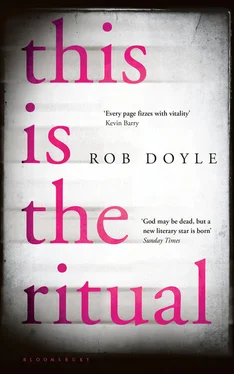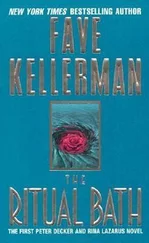Rob Doyle - This is the Ritual
Здесь есть возможность читать онлайн «Rob Doyle - This is the Ritual» весь текст электронной книги совершенно бесплатно (целиком полную версию без сокращений). В некоторых случаях можно слушать аудио, скачать через торрент в формате fb2 и присутствует краткое содержание. Год выпуска: 2016, Издательство: Bloomsbury Publishing, Жанр: Современная проза, на английском языке. Описание произведения, (предисловие) а так же отзывы посетителей доступны на портале библиотеки ЛибКат.
- Название:This is the Ritual
- Автор:
- Издательство:Bloomsbury Publishing
- Жанр:
- Год:2016
- ISBN:нет данных
- Рейтинг книги:5 / 5. Голосов: 1
-
Избранное:Добавить в избранное
- Отзывы:
-
Ваша оценка:
- 100
- 1
- 2
- 3
- 4
- 5
This is the Ritual: краткое содержание, описание и аннотация
Предлагаем к чтению аннотацию, описание, краткое содержание или предисловие (зависит от того, что написал сам автор книги «This is the Ritual»). Если вы не нашли необходимую информацию о книге — напишите в комментариях, мы постараемся отыскать её.
This is the Ritual — читать онлайн бесплатно полную книгу (весь текст) целиком
Ниже представлен текст книги, разбитый по страницам. Система сохранения места последней прочитанной страницы, позволяет с удобством читать онлайн бесплатно книгу «This is the Ritual», без необходимости каждый раз заново искать на чём Вы остановились. Поставьте закладку, и сможете в любой момент перейти на страницу, на которой закончили чтение.
Интервал:
Закладка:
After Natasha had been gone for two months, my fears and insecurities gained such a hold on me that I took to going to bed at night with her red shoes clutched tightly to my chest, under the covers. In truth, I would even have worn them on my hands, or perhaps on my feet, were it not that both my hands and feet were too large for those dainty red shoes, Natasha’s devotion to which I fully understood.
It was now the middle of summer. Having no job to go to, and with most of my friends out of town, I rarely left the flat at all. The sense of claustrophobia in the flat was surpassed by my fear of the world outside, which had never seemed more hostile and sinister. Crime in London no longer has any motive , I told myself, peering at the skyline through my binoculars. Hooded youths will emerge from the shadows and plunge a knife into your groin, or shatter your bones with iron bars, or beat you to a coma in a park at night, raping your every orifice, all for no reason whatsoever. This new breed of London thug takes pride in its absence of motive, I reflected; motive is shame to the contemporary London thug, a creature whose thirst for cruelty is without limit. I imagined that the filth and horror of London was a rising tide, and that soon it would rise right up to our fifth-floor flat and pour in through the windows, a black tide of filth and horror, drowning everything.
Oddly, such morbid and gloomy thoughts as these, while inhibiting me from leaving the flat unless strictly necessary, also had the effect of liberating me from the dread that had prevented me from doing any work at all. Start with one true thing , I told myself in sudden clarity, and the rest would follow. And so it was that, on a bright Tuesday afternoon, with the sound of children’s laughter reaching me from the courtyard, I wrote the following sentence:
Chief among Nietzsche’s virtues is that he is never boring .
On the one hand, I reflected, looking over the sentence I had just written, this was a stunningly banal point to make. On the other hand, it expressed an important truth. The fact is, I told myself, many of even the very best writers are frequently boring, and not only the philosophers. Take, more or less at random, Don DeLillo, a novelist who I revere: all too often he bores me, I reflected. I sit through his books, enjoying them immensely and yet bored out of my head, tempted at every turn to put the book down and do something less boring, like look through my binoculars at the London skyline. Reading, in fact, is a fundamentally boring activity — which is not to say it isn’t the most satisfying thing you can do with your time. In truth, all I did was read, and it’s all I’ve ever done. It was simply that, with so many writers, you have to trawl through the dull parts — sentences, pages, whole dull chapters — to get the hit you’re after, the flash of gold in the tilted pan. Ideally, a book would offer an experience of consistent, unrelieved fascination, charged and compulsive in every sentence. Nietzsche, far too impatient himself to permit a moment’s boredom, offers precisely this ideal, book after book of it, I reflected. Reading him is an unadulterated hit, with nothing mediating between the reader and the ecstasy of pure idea. Nietzsche’s aphoristic style is itself a strategy against boredom. He knew that reading was boring, and that bad books constituted a grave offence, so he was insistent on not adding to the deluge of books that should never have been written, let alone read. Towards the end, I recalled, he had given up reading almost completely, preferring to walk in the hills and mountains around Turin, by the lakes, given over to the ravishment of his senses and the dance of his mind. Having reflected thus for several minutes, I wrote another sentence:
Reading Nietzsche is like smoking crack — an unadulterated hit .
After writing this second sentence I felt good enough to take a walk on the Heath. While ascending Parliament Hill, a forest of cranes stretched across the far horizon, it began to seem to me that, in writing about Nietzsche, I was really writing about boredom, confronting the problem of boredom. All activities are boring, I thought then, because being conscious is boring, and although reading is boring too, it is less boring than all other activities. Consciousness, that was the real problem. To be conscious is to be bored, to seek distraction, and reading is among the least boring, most distracting of all boring activities. That is why I do it, and why I don’t bother doing anything else, if I can help it, I told myself.
I returned to the flat and, too exhausted to work any more that day, stared at the window till the sun had gone down and it was necessary to stand up and turn on the lamp. Glancing in the mirror before going to bed, I was surprised to find that, without having noticed, I had fallen into a state of what can only be described as severe neglect. Not only did I look dishevelled, as was to be expected, but I looked like an old man . And not only that — I also looked demented . I looked like a demented old man, a demented old tramp of a man, the kind of person who should not be let near children nor vested with any responsibility whatsoever. My hair, which had been slowly going grey since my mid-twenties (the result, I was told, of a vitamin deficiency I had never bothered to learn about or rectify), had massively accelerated its process of greying, so that overnight, it seemed, I no longer had a head of black hair streaked with grey, but a head of grey hair flecked with little veins of black, tiny pockets of resistance mopped up by a merciless occupying force. The skin beneath my eyeballs sagged like that of a man twice my age. On the whole, I resembled nothing so much as a wilting plant, left in a pot by a window not facing the sun.
The following morning, after a good sleep, and heartened that I had finally made a start on my study of Nietzsche, even if I had written only two sentences, I arose early and went to buy the makings of a decent breakfast. It was a warm day, and I made a point of lingering for a moment at the grocer’s counter, issuing what I intended to be a casual remark about the weather. Having eaten breakfast, I shaved carefully, and combed my hair in such a way that the grey did not seem so overwhelming as it had the night before. I made myself a strong, very sugary coffee. In the living room I opened the window to let in some air, and sat down at my desk with sunlight streaming all around, to email Natasha. I told her I hoped she was doing well, and that her family was holding together in this very difficult time . I gently suggested she might call or email me soon, the fact being that I hadn’t heard from her in quite a while, though of course that was because she was stricken with grief and not thinking about phone calls or emails to a distant boyfriend. I made a jocular reference to her red shoes. Then I moved on to telling her about the development of my thoughts regarding my study of Nietzsche, hinting at significant progress already made. I explained my recent intuition that the core of my project was no longer Nietzsche himself, but boredom, the existential problem of boredom , as I put it. Nietzsche was merely the platform from which I could launch this enquiry, this meditation on boredom. Then again, I wrote, sipping my coffee, it was entirely possible that Nietzsche was the backbone of a more ambitious and expansive work that would meditate not only on boredom, but on the myriad existential quandaries brought to light by the experience of reading Nietzsche, of which boredom was only one. If this is the case, I must never stray from Nietzsche , I typed with sudden vehemence. Nietzsche is the prism through which I will analyse the human situation in all its multifarious components. I must never stray from Nietzsche .
Читать дальшеИнтервал:
Закладка:
Похожие книги на «This is the Ritual»
Представляем Вашему вниманию похожие книги на «This is the Ritual» списком для выбора. Мы отобрали схожую по названию и смыслу литературу в надежде предоставить читателям больше вариантов отыскать новые, интересные, ещё непрочитанные произведения.
Обсуждение, отзывы о книге «This is the Ritual» и просто собственные мнения читателей. Оставьте ваши комментарии, напишите, что Вы думаете о произведении, его смысле или главных героях. Укажите что конкретно понравилось, а что нет, и почему Вы так считаете.












